What to do with your old digital camera--reuse, reduce, recycle!


One option is to check with the manufacturer of your camera. More and more vendors are providing easy ways to recycle their old products. Canon, for example, lets you print out a pre-paid UPS shipping label for Canon binoculars, camcorders, cameras, compact photo printers, film scanners and video equipment for $6 (plus applicable sales tax). (Shipping labels for Other products like inkjets and copiers cost more.) After following the provided packing instructions, you can drop your package off at a UPS drop site and your product will be "recycled through a licensed recycling facility in an environmentally sound manner."
Sony also offers a recycling program in partnership with the Waste Management company.The program allows you to recycle Sony electronics for free, but you have to drop the product off at a Waste Management eCycling drop-off center. There are locations in all 50 states, but many states only have one or two locations, so unless you happen to live near one you could be in for a haul. According to the Sony website, Waste Management will "collect, store, track inventory and dismantle the products into the form of common raw materials where they can be bought and sold on the global market. In some cases, it is likely that recycled plastics will be purchased for reforming into a new current model electronic product."
Even if your manufacturer doesn't offer a camera recycling option, check to see if they'll recycle rechargeable batteries at least. Nikon, for example, provides prepaid shipping labels for recycling rechargeable batteries (to request a shipping label, call 877-876-4770 or e-mail service@nikonmall.com).
Other companies like Panasonic, don't offer ongoing recycling programs, but instead sponsor recycling events across the country. Read more about Panasonic's efforts here. In addition, Panasonic and other camera vendors, including Kodak, are members of the Electronic Industries Alliance (EIA) whose purpose is to inform consumers about recycling opportunities for use electronics. The EIA's Ecycling Central website provides state-by-state listings of colleciton sites and offers guidance on other recycling options.
You might even be able to make some money off of your "gently used" electronics through BestBuy's trade-in service. Use the online trade-in estimator to determine your trade-in value, print a prepaid shipping label and ship your items to their trade-in center, and then receive a BestBuy gift card for the value of your trade in.
Finally, you can check with your town hall for local recycling events (the county I live in offers two electronics recycling days per year) or even local retail shops that specialize in environmentally responsible products (which seem to be cropping up everywhere these days). In my hometown, a retail store called 3R Living offers an in-store recycling center that accepts hand-held electronics (as well as ink cartridges, CDs and their cases, and crayons, of all things).
Other sites with useful information include: http://www.mygreenelectronics.org/ http://www.recyclingforcharities.com/ http://www.electronicsrecycling.org/ http://www.epa.gov/rcc/plugin/ http://www.epa.gov/epaoswer/hazwaste/recycle/ecycling/donate.htm